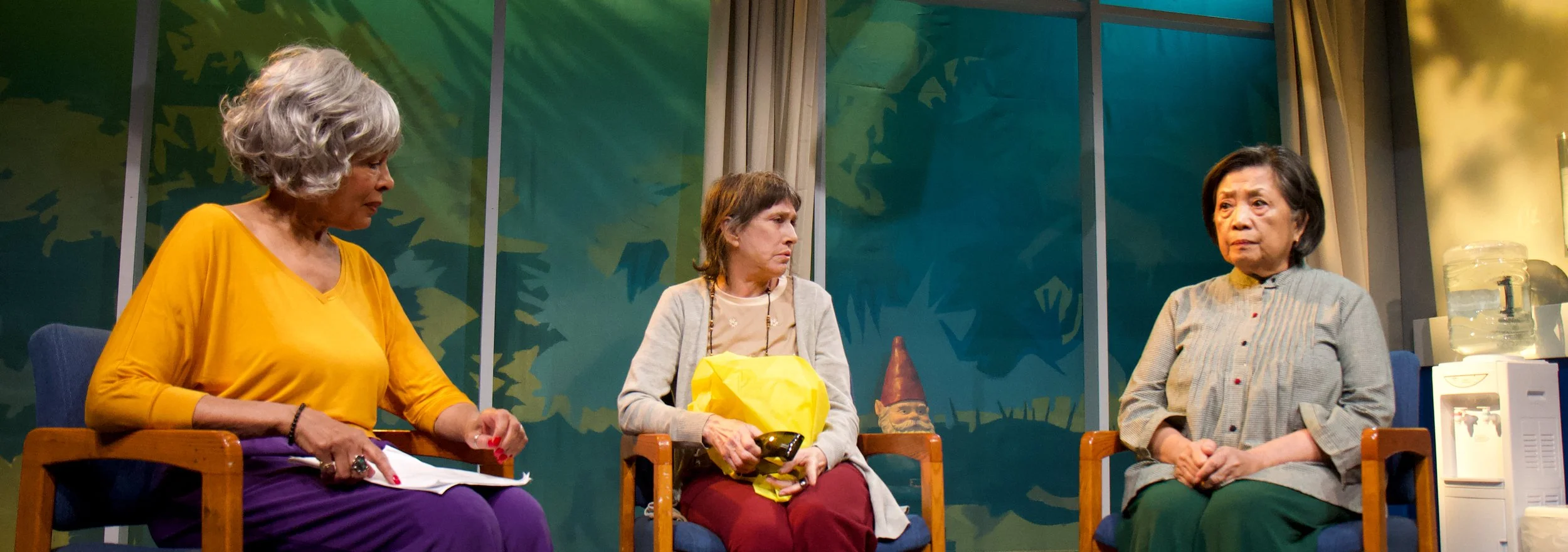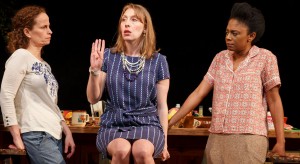Anne Washburn’s The Burning Cauldron of Fiery Fire, making its world premiere at the Vineyard Theatre, defies categorization. The offbeat exploration of an agrarian California commune bordering on a cult might also defy comprehension; your mileage may vary depending on your tolerance for unknowable mysteries. There is something mesmerizing about Burning Cauldron, beautifully strange and compelling, with silliness and menace existing so comfortably side by side. Who needs easy answers when the questions are this much fun?
Air Pump Wheezes
Anne Washburn’s perplexing Antlia Pneumatica takes its name from a constellation. In the 1750s, French astronomer Nicolas-Louis de Lacaille “pulled together leftover stars and made new constellations,” explains Adrian, a visitor to a remote Texas home. The astronomer named one of the constellations he created “the air pump,” known by its Latin name as Antlia Pneumatica. It’s one of the few fascinating points in Washburn’s meandering play.
Subtitled “a play about place, space, grace,” Antlia Pneumatica is structured as a collection of scenes around a kitchen island, monologues, stories, recitations and audio conversations. Most of the latter involve Nina’s two children, who are 5 and 7, but there is a scene of a nighttime encounter of two of the adults that proves a red herring. During these voice-overs, for seemingly interminable stretches, the stage is dark. Although a note from the playwright extols the art of listening to rather than seeing a play, the scenes come off as a torturous radio show and may spur you to cancel your subscription to NPR.
Insofar as Washburn’s title has any parallel to the action, it seems to be that she has used bits and pieces and leftovers as the meat of her story, in the same way that Nicolas-Louis de Lacaille collected unused stars for his constellations.
The deceased friend is named Sean, and he lived in New York; most of the characters had lost touch with him following his downward spiral into alcoholism. Much is made of who is coming for the scattering of Sean’s ashes, and a viewer has to listen closely to realize that, as the play progresses, other characters have arrived besides the ones who are on stage. New cars belonging to new names are parked in the driveway.
The conversations seem deliberately mundane and opaque, and although director Ken Rus Schmoll imparts a certain sporadic charge to them, and there’s a sense that the characters know one another so well they use shorthand to communicate, the effect is frequently to leave the listener at a loss.
When Len arrives carrying the ashes of Sean (earlier the character who was picking them up was a woman, but who knows what happened to her?), there’s talk about where to scatter him, and Nina even suggests baking a teaspoon into food they’d consume. This plot twist is not only unpalatable, but it has been done to death: the mistreatment of cremated remains in the theater is a Ph.D. thesis waiting to happen.
Late in the play, a friend named Bama arrives, and Crystal Finn brings an espresso shot of energy to the lethargic proceedings as a fast-talking Southern charmer. (Finn appears earlier in a scene with the others, all standing at the forestage and speaking directly to the audience; there’s no effort to explain who her character is or why she’s there and then disappears until the end.) A recollection from Bama sparks a story from Len that ends the drama on a supernatural note. The cast sings a song as the play peters out.
Washburn has a following and her work is produced regularly, but she also has skeptics. Obscure and unsatisfying, Antlia Pneumatica will give the latter plenty of reason to carp.
Anne Washburn’s Antlia Pneumatica runs through April 24 at Playwrights Horizons (416 W. 42nd St. between 9th and 10th Aves. in Manhattan). Evening performances are at 7:30 p.m. on Wednesday-Saturday and at 7 p.m. on Sunday; matinees are at 2 p.m. on Saturday and Sunday. For tickets, call Ticket Central at 212-279-4200 or visit TicketCentral.com.









